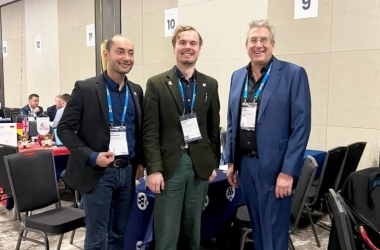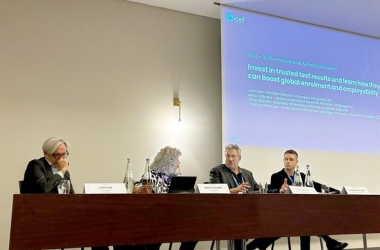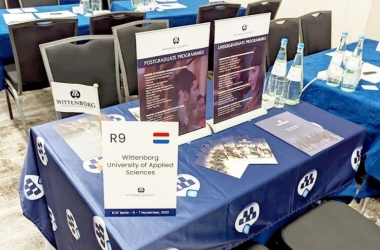Wittenborg Online News!
Wittenborg Expands Network at ICEF Berlin

Wittenborg Expands Network at ICEF Berlin
School’s Representatives Participate in Panel and Meet with More than 70 Student Agents
During the event, Wittenborg was represented by its president, Peter Birdsall, as well as Admissions Manager Mykhailo Huba and Admissions Administrator Amin Nadervandi.
Huba and Nadervandi were responsible for networking with student agents and connected with over 70 professionals over the course of the conference. Birdsall’s activities included participating in a panel session alongside two other education experts: International Recruitment Manager Tom Whittaker from the University of Central Lancashire and Portfolio Director of Languages Liam Vint from LanguageCert.
Organised by LanguageCert, the session centred on three areas: the Importance of English Language Testing for International Students; the Important Role Scholarships Play in Student Recruitment and Diversification; and Employability and the Role Universities and Colleges Can Play.
According to Birdsall, the panel was very productive and useful, being attended by approximately 30 people. “That was very good because at ICEF Berlin they run lots of panels simultaneously in different rooms, about various subjects. So, people had a number of options,” he highlighted.

Among other topics, the discussion on language testing addressed the fact that a new accreditation process will be conducted to select more official providers for testing the English-language skills of international applicants wishing to study in the Netherlands. The process will start on 1 January, and the accredited providers will be listed in the Code of Conduct for International Students in Dutch Higher Education.
The president of Wittenborg pointed out that during the second section of the panel, he had the opportunity to explain how the school has used scholarships to create more diversity.
“One of our goals is to attract more students from within the European Union, and we offer them scholarships because we are competing with government-subsidised schools in the Netherlands that charge much less when it comes to fees. And the other scholarships we give are mainly for highly-skilled and motivated master’s students, who have a wide choice of places they can go to. We are basically trying to balance the numbers of students that will just pay the full fee and those who will get the scholarships, to get diversity but also excellence.”
The final section, on employability, revolved around the measures that schools have implemented to help students and graduates progress in their careers.
In addition to joining the panel session, Birdsall also had regular meetings with people from other higher education institutions, with the goal of getting a real feel of what is going on within the market. “The Berlin event is the biggest ICEF conference, and it gathers people from all over the world, not only from the higher education sector but also from language schools and high schools. I had high-level conversations with people who were representing large groups of universities and, thanks to Amin and Mykhailo’s work, our agent network has just increased enormously,” he underlined.

Expanding Wittenborg’s network
During the conference, Huba and Nadervandi met with agents who are currently collaborating with Wittenborg and also with professionals who were not yet part of the institution’s network. These meetings were aimed at providing agents with updated information about the school, its programmes and current goals.
Among other nationalities, Wittenborg’s representatives interacted with agents from Georgia, India, Iran, Italy, Türkiye, Kenya, Latvia, Spain, Kuwait, Azerbaijan, Germany, Singapore, Hungary, Algeria, Jordan, Czech Republic, Brazil and the United Arab Emirates.
For both Huba and Nadervandi, it was the first time attending ICEF Berlin.
“I was really excited to participate in ICEF Berlin physically, for the first time. Previously, I had taken part in this event online, during the pandemic, but this is a completely different experience. Since Wittenborg is an international business school, events like this help us to establish contacts with partners worldwide and to ensure that our student body will have a good mix of nationalities,” Huba commented.
Nadervandi stressed that the ICEF conferences are important because they help maintain consistent contact with the people who are active in the education industry. “It gives us the opportunity to build connections that will result in more students coming from different regions, promoting the internationalisation of Wittenborg. On top of that, by networking with other education institutions and student agencies, we get the chance to understand how the others are operating and adapting to the changes in the market,” he emphasised.
WUP 23/11/2023
by Ullisses Sawczuk
©WUAS Press
827 words